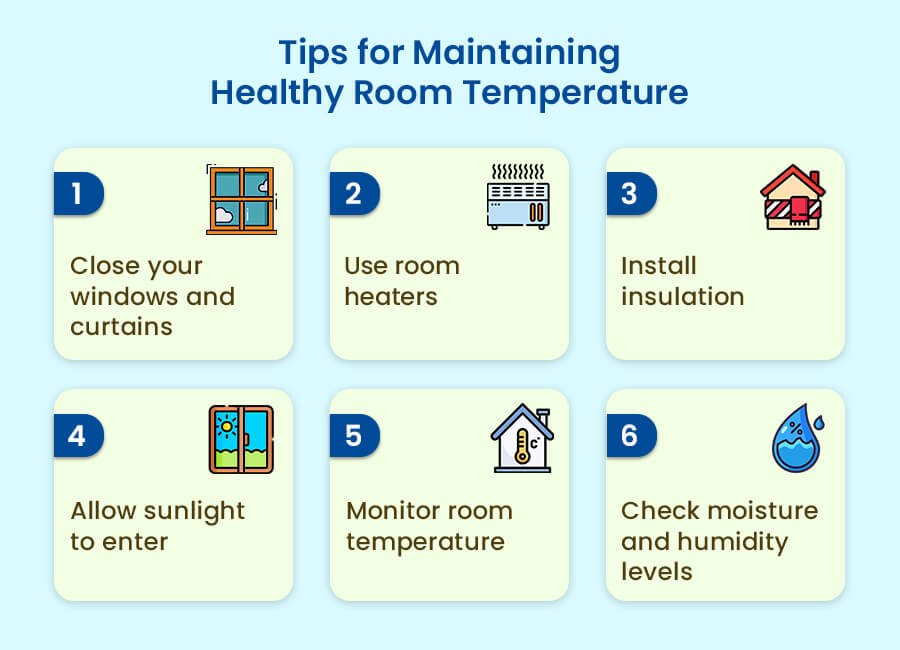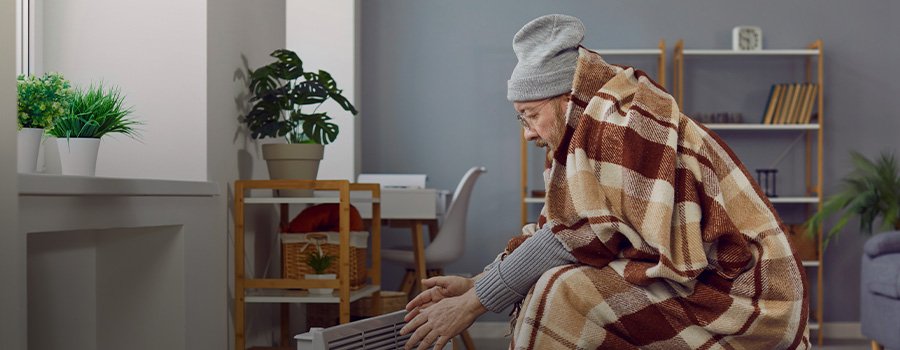During the colder months in winter, seniors can become more sensitive to changes in temperature. The inability to regulate their body temperatures can make them more susceptible to hypothermia – a condition caused by prolonged exposure to cold weather. Cold temperatures can also worsen existing medical issues, such as arthritis and heart problems. Thus, it is essential to maintain the best room temperature at a comfortable level to help seniors stay safe and healthy during the winter months.
Table of Contents
Tips for Maintaining a Healthy Room Temperature for Elderly People

Keep the windows and curtains closed after 5
Close windows and curtains in the evening or during the day if it is windy outside. It helps to keep out cold drafts and conserve heat. By keeping curtains and windows closed, the warm air inside the home is not allowed to escape. This can help reduce heat loss and maintain a comfortable temperature that aids in keeping the place warmer.
Use room heaters
Room heaters generate heat that can quickly raise the temperature and provide comfortable warmth. They are also a cost-effective way to get rid of cold during winter. The heat produced by the room heaters is uniformly spread around a room. Additionally, they can help reduce energy costs by providing a way to heat a room without using the heating system for the entire house.
Make sure to have the heater inspected and serviced at regular intervals to prevent any molds or bacteria from spreading infection. If the seniors are using a space heater, be sure to follow all safety guidelines while using it.
Install insulation
Insulation helps to maintain the best room temperature in winter by trapping heat indoors and preventing warm air from escaping. The insulation acts as a barrier between the inside and outside air, creating a buffer that keeps the warm air in and the cold air out. This helps to keep the indoor temperature consistent and comfortable regardless of the temperature outside. Additionally, insulation also reduces energy costs by keeping heat inside your home instead of letting it escape through the walls and roof.
Allow sunlight to enter the rooms
It is crucial to keep the windows, or the curtains open on warmer days during winter season to allow the sunlight to enter the room and naturally heat the space. As the heat is generated through natural resources, the usage of power heating systems is also reduced – which saves money on energy costs. Besides, sunlight also helps to improve moods and reduces stress and depression, which can be particularly important during the darker winter months.
Monitor room temperature
Monitoring room temperature is the key to stabilizing the warmth in the room as it alerts the caregiver or the seniors when the temperature is too high or too low. This allows a user to adjust the thermostat or take other corrective measures to bring the temperature back to a comfortable level. One can monitor room temperature using a variety of different methods such as a thermometer, a digital temperature monitor, or even a smart thermostat. Also, temperature monitoring devices can be connected to home automation systems so that the homeowner can monitor the temperature remotely.
Keep an eye on reducing moisture and humidity
Humidity can make a place feel colder than it is. Use a humidifier which can assist in preserving the ideal relative humidity in the air and increase its comfort and warmth. The additional humidity can also help keep dust and allergens out of the home, improving the air quality. Moreover, excessively dry air can irritate the skin and cause respiratory issues. Hence, it is critical to keep the humidity level between 45% and 50%.
Consult a doctor at senior care services if your older adults have any chronic illness or a history of allergies. A physician can help track the problem and help a caregiver to determine the comfortable room temperature for older adults. Contact EliteCare Health Centers in Florida to consult the best geriatricians.
Safe Room Temperature for Elderly People
Each individual has a somewhat different preference for the temperature of the space. The safe room temperature for elderly people during winter is between 65-68°F (18-20°C). This comfortable temperature is neither too hot nor too cold and creates a comfortable space for seniors.
Summing it Up
In conclusion, maintaining a comfortable room temperature for seniors in winter can be a challenging task. While it is important to keep the home warm to avoid health problems, it is also important to ensure that it does not become too warm, which can be even more dangerous. With proper insulation, the proper use of heating appliances, and a proper home maintenance plan, you can help ensure that seniors are comfortable and safe during the winter months.





